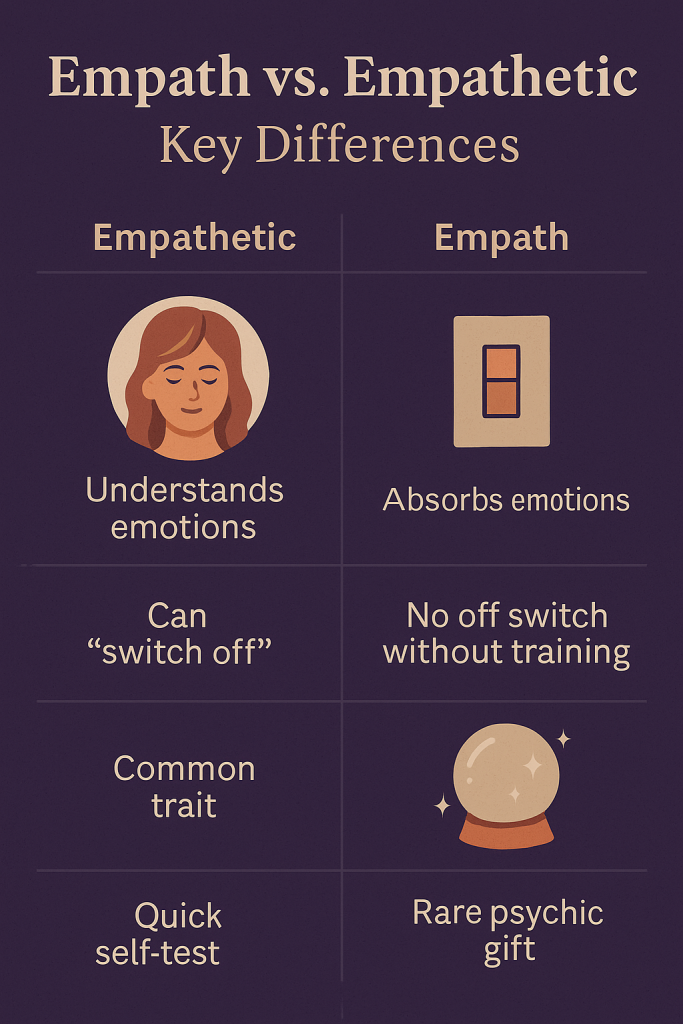Introduction: More Than Just “Feeling for Someone”
Have you ever been called “too sensitive,” “a people magnet,” or “the one who always knows how everyone else is feeling”? Chances are, you’ve wondered if you’re simply empathetic—or if you’re an empath. While those two words sound like siblings, they don’t mean the same thing.
Being empathetic is a skill, one that psychology and leadership experts say can be cultivated and practiced. Being an empath, however, is a way of being. Empaths don’t just understand emotions—they absorb them, like emotional sponges walking around in a noisy world of feelings.
This article goes far beyond the surface definitions you’ll find elsewhere. We’ll look at psychology, culture, psychic perspectives, and real-world examples. By the end, you’ll not only know the difference—you’ll see why psychics often recognize empaths as possessing powerful intuitive gifts.
The Psychology of Empathy
Psychologists define empathy as the ability to understand and share the feelings of others. It’s about perspective-taking and compassion, not about merging identities. Researchers at the Cleveland Clinic explain that empathy is crucial for relationships, problem-solving, and emotional intelligence (Cleveland Clinic).
There are actually types of empathy:
Cognitive empathy: intellectually grasping someone else’s perspective.
Emotional empathy: feeling another’s emotions with them, though not as your own.
Compassionate empathy: pairing understanding with action—helping, supporting, comforting.
Example: Imagine your friend is upset after a bad day at work. If you’re empathetic, you’ll listen, validate their frustration, and maybe bring over ice cream. You get their feelings without drowning in them.
Empathy is like tuning into a radio station clearly, but knowing you can switch it off when needed. An empath, however, often can’t find the off button.
What Makes Someone an Empath
Being an empath goes beyond empathy. Empaths don’t just sense emotions—they absorb them. Psychology Today notes that empaths experience other people’s joy and pain as if it were their own (Psychology Today).
Common signs of being an empath include:
Sudden mood changes when you enter a room.
Feeling drained in crowded spaces.
Knowing what someone is feeling even when they deny it.
Picking up physical sensations, like headaches or fatigue, that aren’t your own.
Example: One empath client walked into a meeting and instantly felt anxious, though she had no reason to be. Later she discovered two colleagues were locked in a quiet feud—the tension wasn’t hers, but she carried it like luggage.
Empaths are like human Wi-Fi—constantly connecting to others’ emotional signals, often without consent. This is what makes them unique in the psychic world: their sensitivity isn’t just emotional, it’s energetic.
The Energetic Side of Empaths
Empaths don’t just “understand” emotions—they absorb them like a sponge in a rainstorm. This is what makes them stand out in psychic and spiritual circles. Many empaths describe walking into a room and instantly feeling an emotional temperature check before anyone speaks. If the energy is heavy, they’ll feel it in their chest or gut. If it’s joyful, they might light up before even knowing why.
Psychically, empaths often overlap with clair-sentients—those who sense energy physically. They might pick up headaches that belong to someone else or feel restless because a loved one is upset miles away. Unlike empathy, which is cognitive, empathic ability is energetic. It crosses boundaries of time and space.
One empath told me she felt sudden grief one evening without reason. The next day, her best friend called to say her father had passed—at almost the exact moment she felt it. That’s empathic connection, not just emotional imagination.
Cultural and Historical Views
Across history and cultures, people we now call empaths were seen as healers, shamans, or spiritual intermediaries. In Indigenous traditions, such sensitivity was often treated as sacred, a gift for guiding and protecting the community. Empathic perception was not just personal—it was communal, a way of attuning to the needs of others without words.
In ancient Greece, oracles were said to channel not just divine messages but also collective emotions. In many African traditions, intuitive feelers helped mediate disputes by sensing the “true feeling” of those involved. Even in modern leadership, empathy is being re-embraced as a strength, not a weakness (Harvard Business Review).
These cultural threads remind us that being an empath is not new. It’s a timeless role, reappearing wherever communities need emotional translators.
Empaths in Psychic Work
Many empaths naturally gravitate toward psychic or healing practices because their sensitivity is already tuned to subtle energy. When an empath learns to focus, what once felt like emotional chaos becomes a finely honed tool.
In psychic readings, empaths may feel the unspoken emotions of the client, sometimes before a word is shared. A tarot spread in their hands is not just symbolic—it’s resonant, infused with the vibrations they pick up from the seeker’s energy. Some empaths channel impressions from spirit guides or ancestors because they are so attuned to energies beyond the physical.
Example: A psychic empath once described sensing a client’s “heart tension” before the client even spoke. As the reading unfolded, the cards confirmed heartbreak, and the empath guided her through healing rituals. The ability to feel another’s emotions as one’s own turned into compassionate direction instead of painful overload.
Empaths, when developed, often become healers, mediums, or spiritual counselors. What others might dismiss as “too sensitive” is actually the foundation of psychic connection.
The Cost of Being an Empath
Of course, great gifts carry great challenges. For empaths, the biggest struggle is emotional and energetic overwhelm. Without boundaries, they risk burnout, compassion fatigue, and even physical illness.
An empathic nurse I once spoke with described leaving each shift with crushing headaches—not from her work, but from unconsciously absorbing the grief and stress of patients and families. Only when she learned grounding and shielding techniques did she regain balance.
Psychology Today warns that unregulated empathic sensitivity can leave people exhausted, especially in relationships or crowded settings (Psychology Today). The challenge is not in being empathic—it’s in not drowning in other people’s currents.
That’s why many psychics teach empaths protection rituals: visualizing golden light shields, carrying grounding stones like black tourmaline, or practicing mindful detachment. These practices don’t turn off the gift—they make it manageable.
Tools to Thrive as an Empath
For empaths, thriving is about turning sensitivity into strength. The right tools can transform overwhelm into empowerment.
Crystals are often a first step. Black tourmaline shields against negative energy, while labradorite helps filter emotional noise. Many empaths wear them as jewelry or keep them in pockets for daily protection.
Meditation is another powerful tool. Simple practices like visualizing a protective bubble or repeating grounding affirmations help empaths separate their energy from others. Some also find relief in aura-cleansing rituals—using sage, palo santo, or even sound bowls to reset their energetic field.
A practical exercise: journaling. Writing down what you feel helps identify whether emotions are yours or borrowed. Paired with psychic tools like tarot or pendulum checks, journaling becomes a map of your inner world versus what you’ve absorbed.
With these tools, empaths don’t just survive—they learn to wield their gifts with confidence.
Empathy vs. Empath in Love & Relationships

The difference between empathy and being an empath is especially vivid in love. Someone empathetic might comfort a stressed partner, saying, “I understand you’re overwhelmed.” An empath, however, might feel the partner’s anxiety in their own body, to the point of sleepless nights or tension headaches.
Example: An empathic woman once realized her migraines always flared when her boyfriend was anxious about work. Once she learned to ground herself, the headaches eased—even when his stress didn’t.
Empaths in love often mirror their partner’s emotions, which can be both a blessing and a burden. They create deep bonds but may also lose their sense of self if they don’t protect their energy. Meanwhile, empathetic people maintain supportive distance—they care, but they don’t merge.
This difference explains why many empaths seek psychic guidance in relationships. A psychic can validate what is theirs versus what belongs to the partner, helping them untangle love from energetic entanglement.
Empathy in Modern Society
In today’s world, empathy is being recognized as a vital leadership and relationship skill. Companies and schools now emphasize the power of empathy in building trust, cooperation, and innovation. Harvard Business Review highlights that empathy in leadership improves morale, retention, and creativity—making it as important in the boardroom as in the living room (Harvard Business Review).
For empaths, this recognition is a double-edged sword. On one hand, society finally values their natural gift. On the other, workplaces and social settings can unintentionally exploit that sensitivity, leaning on empaths as emotional caretakers. The challenge is learning to share empathy without sacrificing well-being.
How to Know Which You Are
So how do you know if you’re simply empathetic or a true empath? Here’s a quick self-check:
You might be empathetic if you can understand and respond compassionately to others but still feel a clear boundary between their emotions and yours.
You might be an empath if you physically or emotionally take on others’ moods, even when you don’t want to, and struggle to separate your feelings from theirs.
Example: An empathetic person might hear a coworker complain about stress and respond with support. An empath might leave that same conversation with a racing heart and a headache—carrying stress that isn’t theirs.
Journaling helps clarify which category you fall into. If you notice patterns of unexplained emotions tied to social situations, you may be more than just empathetic.
Why Psychics Encourage Empath Development
Psychics often see empaths as gifted souls standing at the threshold of deeper intuitive abilities. Where an empathetic person practices compassion, an empath already lives in the realm of energetic exchange. With training and guidance, that sensitivity can evolve into clairvoyance, mediumship, or healing work.
The challenge for many empaths is learning discernment—figuring out what belongs to them versus what belongs to others. Psychics encourage empaths to treat their gift as a doorway rather than a burden. Through shielding practices, grounding rituals, and intuitive exercises, empaths can transform overwhelm into clarity.
Example: A young empath came to a psychic mentor, feeling broken because she “felt too much.” With coaching, she realized those feelings were her compass. She began using tarot not just for herself but to help others. Today, she reads professionally, channeling her sensitivity into service rather than stress.
Psychics know that when empaths embrace their abilities, they become powerful conduits of insight and healing—exactly what our world needs.
Conclusion
The difference between empathy and being an empath is more than vocabulary. Empathy is a vital human skill, one that can be learned and strengthened. Empaths, however, live it on a psychic and energetic level, carrying both the blessing and burden of deep sensitivity.
Empathy keeps us human. Empaths remind us of our connection to something greater—the unseen threads of energy weaving us together. If you suspect you’re more than empathetic, honor your gift. Protect it, nurture it, and explore psychic guidance to unlock its potential.
Because in a world often starved of compassion, both empathetic people and empaths are needed. But empaths, with their psychic edge, may just be the quiet healers who light the way forward.
FAQ
What’s the difference between empathetic and empath?
Empathetic means you understand and share feelings. An empath absorbs emotions energetically, often feeling them as their own.Is being an empath the same as being highly sensitive?
They overlap, but aren’t identical. Many empaths are highly sensitive; not all highly sensitive people absorb others’ emotions.Can empathy be learned while empath ability is innate?
Empathy is a skill you can practice. Empathic absorption tends to be innate, though you can train boundaries and protection.How do I know if emotions I feel are mine or someone else’s?
Pause and scan: Was there a trigger in your life? If not, you may be picking up another’s energy. Journaling helps spot patterns.Why do empaths feel drained in crowds?
Multiple emotional signals hit at once. Without boundaries, the empath’s system processes those signals like they’re personal.Can empaths pick up physical sensations too?
Yes. Some empaths experience others’ headaches, fatigue, or stomach flutters as transient, borrowed sensations.Do empaths make better psychics?
They can, because they already perceive subtle energy. With training, their sensitivity becomes a reliable intuitive tool.What daily practices help empaths avoid overwhelm?
Grounding breath, short meditations, protective visualization, and brief nature breaks help reset your field.Which crystals help shield empath energy?
Black tourmaline for protection, labradorite for filtering, hematite for grounding, and amethyst for calm focus.Are boundaries unkind for empaths?
Boundaries are compassionate. They let you help without depleting yourself or enabling emotional dependence.How does empathy show up at work versus empath ability?
Empathy guides listening and teamwork. Empath ability can sense the room’s mood shifts—useful if managed, draining if not.Can I reduce empath overwhelm without losing my gift?
Yes. Think dimmer switch, not off switch. You can lower input with shielding, time limits, and intentional recovery.Do empaths attract narcissists?
Often, because empaths give and narcissists take. Boundaries and early red-flag detection prevent enmeshment.What role does the Third Eye play for empaths?
It’s your intuitive hub. Overactivity or congestion can heighten emotional static. Gentle practices restore balance.How do I explain my needs to loved ones?
Use simple frames: I feel deeply and need quiet resets to stay present. Clear requests beat vague hints.Can therapy support empaths?
Absolutely. Therapy builds skills for boundaries, self-trust, and nervous-system regulation that protect your gift.How do I handle absorbing a partner’s stress?
Name it, ground, and separate: I feel your stress, and I’m returning it with love. Then do a brief reset ritual.Are all empaths introverts?
No. Some are social but still need structured recovery time after high-input environments.How can I tell if I’m empathetic, empath, or both?
Empathetic if you understand and respond compassionately. Empath if you also absorb. Many are both to different degrees.When should I seek psychic guidance?
When you’re unclear whether emotions are yours, at choice points, or after repeated overwhelm despite good self-care.





I appreciate the detailed explanation of how empaths need to set boundaries. It’s crucial to understand how absorbing others’ emotions can impact one’s own mental health.
The connection between empathy and compassion is well articulated. It’s enlightening to understand how deeply empaths can feel and how that differs from general empathetic behaviors.
The distinction between empathy and being an empath is quite profound. It’s interesting how empathy relies on shared experiences, while an empath inherently senses the emotions of others without any overt cues.
The concept of picking up emotions subconsciously and consciously as an empath is fascinating. It makes me wonder about the neurological underpinnings of such abilities.
An important point raised here is the need for empaths to ground themselves. Techniques like spending time in nature or speaking with a psychic adviser might be beneficial for their well-being.
This article provides an insightful distinction between empathy and being an empath. It’s enlightening to understand how being an empath involves deeply feeling others’ emotions to the point of physical sensation. The emphasis on setting boundaries is crucial; it’s a reminder of the importance of self-care while offering support to others. A well-articulated piece!
Comments are closed.